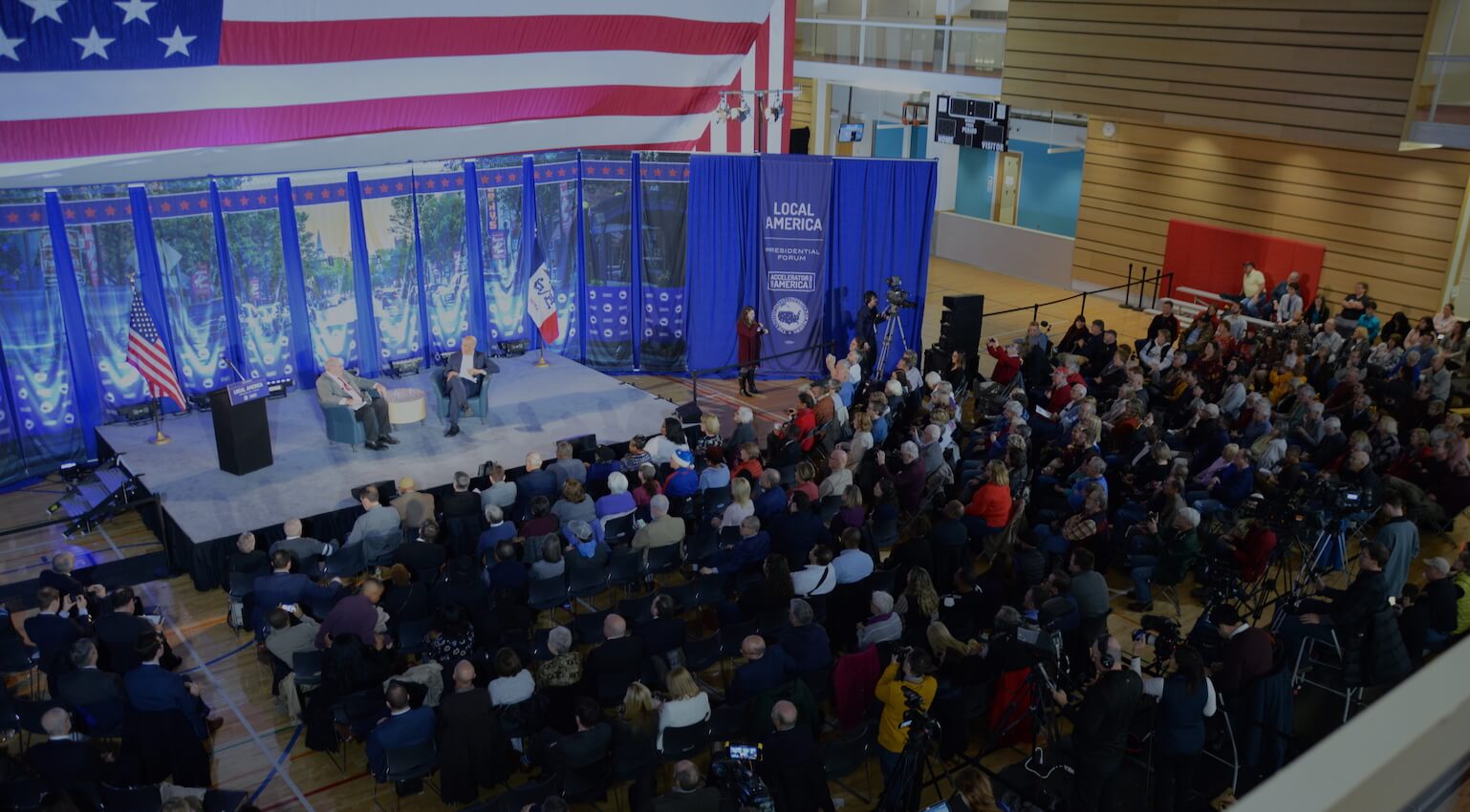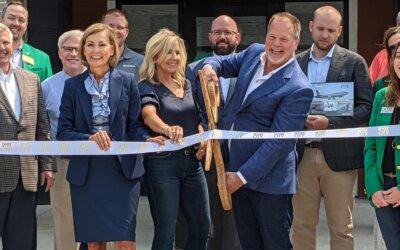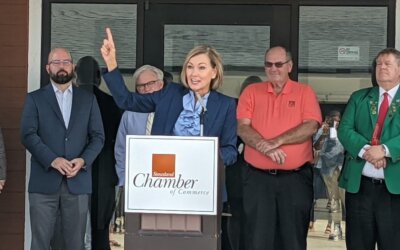
Five 2020 Democratic candidates were peppered with questions in Waterloo, Iowa, on Friday, about their agendas for local America and asked how to lessen the disconnect between Washington and cities nationwide.
Infrastructure, housing and economic development were highlighted at the Local America Presidential Forum as Pete Buttigieg, Cory Booker, Julián Castro, Amy Klobuchar and Tom Steyer, each paired with a midwestern mayor who hasn’t yet endorsed a candidate, spoke individually about the challenges facing metro areas.
“The question has been, why Waterloo?” the city’s mayor Quentin Hart said during the forum’s introduction. “And my response has always been, why not Waterloo? If you take a look at it, Waterloo, Iowa, in Cedar Valley is the model mid-sized American city… Your voices need to be heard, because we matter, our voices matter.”

Pete Buttigieg will soon end his tenure as South Bend, Indiana, mayor, while New Jersey Sen. Cory Booker was elected as a two-term mayor of Newark from 2006 to 2013 and former U.S. Housing Secretary Julián Castro served as mayor of San Antonio, Texas, from 2009 to 2014.
The Accelerator for America organization co-hosted the event with the U.S. Conference of Mayors. Headed by Los Angeles Mayor Eric Garcetti, Accelerator focuses on transit, infrastructure and economic development at the city level with hopes to bring national change up to Washington. The U.S. Conference of Mayors represents over 1,400 of the nation’s cities with populations of over 30,000.
“What is happening here today has never happened before. American mayors will engage those who are seeking the highest office in this land.” Garcetti said. “The voice of local America today will be brought to these candidates… We’re going to challenge the candidates today on their local solutions.”
[inline-ad id=”1″]
Sen. Amy Klobuchar, Interviewed by Mayor Quentin Hart, Waterloo, IA
Minnesota Sen. Amy Klobuchar fielded questions first from recently re-elected Waterloo Mayor Quentin Hart. Now serving his third term, Hart is the city’s first African American mayor and has been an advocate for the city’s vast development needs.
Klobuchar addressed this need for development, focusing on infrastructure while answering questions about climate, racial justice and public schools.
“I was the first candidate to lead with an infrastructure proposal. And when I did it, the commentators said, ‘Well, this isn’t very sexy.’ And I think our local officials know, there’s nothing sexier than a good sewer/water project,” Klobuchar said, which was met with laughs and cheers.

She said she’d invest over a trillion dollars in infrastructure as president and pay for it by raising corporate taxes.
When pressed on her plans to mitigate climate change, Klobuchar said she’d implement sweeping legislation, including putting in place more resilient infrastructure. She also said she’d instate a civilian climate change corps focused on volunteering and infrastructure, a concept she adopted from former candidate Washington Governor Jay Inslee.
Klobuchar also touched on how she’d improve relations between the federal and local levels.
“We need to understand that this is not shared prosperity right now, the way we run this government … it’s too much at the top, and the tax bill is exhibit A,” Klobuchar said. “So, our job, and my job as President … would be to improve people’s lives. And that means to make sure that we have shared prosperity.”
[inline-ad id=”0″]
Several other recurring points surfaced throughout Klobuchar’s time on stage, including widening access to affordable childcare, raising the federal minimum wage and strengthening democracy. Klobuchar addressed these topics when questioned about racial disparities that have been afflicting Waterloo and the nation’s racial divide.
“It’s everything from childcare, to raising minimum wage,” she said. “But it is beyond that. It is making sure that people have the right to vote so they can make their voices heard.”

Klobuchar spent some lighter moments on stage, telling a number of stories about her home state of Minnesota. She explained how her Grandfather, an iron ore miner, was from Duluth, a northern city that experienced revitalization after the iron industry became obsolete. After noticing a Minnesota Vikings jersey in the forum’s front row, Klobuchar became excited.
“I won’t ask any Iowa versus Minnesota football questions,” joked Hart.
“Hey, they’ve had their best season that they’ve had in a long time!” Klobuchar replied.
[inline-ad id=”2″]
Secretary Julián Castro, Interviewed by Mayor Andy Schor, Lansing, MI
Mayor Andy Schor took office in January of last year. He interviewed Julian Castro and the conversation focused on issues like homelessness, education, housing and how the federal government relates to city government.
When answering, Castro drew on his experience at the Department of Housing and Urban Development, where he served under President Barack Obama.
For the first question, Schor asked him to introduce himself, and Castro talked about how he got into public service, on the city council in San Antonio, and what he learned there. On the city council, he said he learned how a lot of issues are connected and the solutions should be too. And that was one theme of his speech.

To illustrate his point, Castro told a story about how building a sidewalk in a neighborhood was directly related to a constituent’s health because it would give her the ability to walk around.
As president, Castro said he would bring that perspective of the way different issues overlap to every solution he would propose from housing to education.
“We need to work with you at the local level to invest in solving problems that reflect the way people are living now,” he said. That theme of using the federal government to work with local governments came up in many of Castro’s responses. He also acknowledged that, in many ways, local governments solved problems better than the federal government does.
“I applaud local communities that have taken the lead where Washington, D.C. has utterly failed,” he said.

Schor also asked various questions about how Castro would handle funding for local communities, particularly those that generate their own revenue. That question of funding, and how to use it, was another focus.
Castro talked about increasing the funding for Community Development Block Grants, implementing formula funding and balancing state funds with those that local communities receive.
As an example, he brought up a public-private partnership the Obama Administration pursued with internet service providers and housing authorities to offer free or low-cost broadband internet with people in public housing.
“We can think in creative ways to leverage our resources [and make those things], and by the way, I would connect the dots of [funding] so that we’re actually looking at how we can make those dollars stretch further and reward communities that are connecting those dots better,” Castro said.
[signup_form]
Senator Cory Booker, Interviewed by Mayor Bob Scott, Sioux City, IA
Currently serving his third consecutive term as Sioux City’s Mayor, Bob Scott took the stage to question Cory Booker. “Every four years, we like seeing people like you in Iowa, our economy goes up dramatically,” Scott joked with Booker.
The New Jersey Senator seemed to be at home on stage with the Mayor. He often referenced his service in Newark, including his successes strengthening the affordable housing stock and lessening homelessness, increasing access to capital and reforming criminal justice.
“My whole life has been focused on cities,” Booker said. “When I became mayor, my best support in government were other mayors. Sharing ideas … We did not care about partisanship, if you are a mayor, you find ways to create uncommon coalitions to make uncommon results.”

Booker acknowledged that mayors and local advocates see America from the ground, and often have to get creative on solutions with a lack of robust federal help.
“Often you see the federal government giving money to states who then make decisions with the money, that would again, not be for the grassroots leaders who need to create change,” Booker said.
[inline-ad id=”3″]
Scott was originally elected as the mayor of the Northwestern Iowa city in 1985, and again in 2012. He said he’s seen a number of Iowa caucuses, and has often heard empty promises from candidates as they roll through the state. He questioned Booker what would be different this time, especially about promises regarding infrastructure overhauls.
“When you say infrastructure, everybody knows that means more than roads, bridges, rail systems,” Booker said. His infrastructure plan would be wide enough to include aspects like environmental justice and broadband access. It will get done by putting together teams of experts, he said, with access to a greater number of federal tools.

One of the tools, Booker said, that he didn’t have as mayor but had introduced on behalf of local leaders during his time in the U.S. Senate, was the introduction of opportunity zones — sections of cities where investors are promised a capital gains tax reduction if they inject income into designated low-income census tracts.
Booker then spent a substantial amount of time on stage talking about housing struggles and homelessness. He referenced his plan to increase renter’s tax credits among other solutions.
“Dear God, we need a mayor in the white house,” Booker said. “Someone who knows how to work on the ground and make change.”
Businessman Tom Steyer, Interviewed by Mayor Quinton Lucas, Kansas City, MO
Mayor Quinton Lucas is a brand-new mayor, having been elected about three months ago. Before that, he worked as a lawyer in Kansas City and he interviewed the only candidate who is not and never has been, a mayor.
When Tom Steyer took the stage at the mayor’s conference, he brought empathy and a theme of humanity.
“I am aware that when I read about myself in the paper, people describe me as rich,” Steyer said, when invited to introduce himself. “And I happen to think that I’m a human being, which is a little different from that. I don’t think I’m a Monopoly character.”

He also went over how he started NextGen America, a progressive nonprofit that works to mobilize young voters, and how it’s succeeded in Iowa with increasing voter turnout.
Steyer got questions about infrastructure, how to make businesses care about climate change, supporting schools, education, homelessness and taxation.
On education, Steyer said teachers should be better supported for the important work they do.
“We have to stop thinking about education as a cost and start thinking of it as an investment in the young people in the United States,” he said, to loud applause. “The way that we’re going to be prosperous in the future is by Americans succeeding and getting the support they need from the government. How are Americans going to be successful if they’re not well-educated, well-trained and well-supported?”
[inline-ad id=”4″]
On many topics, Steyer pointed out the areas where the current federal government is failing Americans. Among them was climate change, immigration, and health care, specifically mental health. He promised he would switch up how the federal government prioritizes those issues if he’s elected.
“All the things we think we’re reaching for: quality public education, living wage, affordable health care, clean air clean water; those are our rights,” Steyer said. “That’s the foundation of American life going forward in the 21st Century.”

Steyer blamed a lot of the country’s struggles on Republican policies being cruel to Americans.
“There’s a different story to be told in the United States and that’s this one: We rise and fall together,” he said. “Your success is my success and my success is your success. We can’t have this injustice and inequality in this country.”
The final question Lucas asked Steyer was about how America would look after his first term.
After a pause, Steyer said, “We will be growing because we will be supporting and investing in the American people. That is what we’re going to do. The corporations are going to scream like hell and if they’re not screaming, I’m not doing my job. If they don’t think I’m the biggest SOB that ever walked on the planet, forget it, I’ll quit. But we’re going to have something where we’re proud. We are going to be proud of what this country stands for if it kills me.”
Mayor Pete Buttigieg, Interviewed by Mayor Lori Lightfoot, Chicago IL
After taking office last May, Chicago Mayor Lori Lightfoot has since dealt with issues of homelessness, economic inequality and violence, and spent her time on stage talking with Pete Buttigieg about the same problems.
Lightfoot hasn’t yet endorsed a candidate, but the Chicago Tribune reported that former U.S. Sen. Kamala Harris, of California had lobbied for her support before dropping out of the presidential race this week. According to her political campaign staff, Lightfoot had taken an interest in Harris’ campaign.

As the first African American woman elected as Chicago’s mayor, one of the first items Lightfoot questioned Buttigieg about his low poll numbers among black voters.
“You’re aware that one of the consistent narratives about your campaign is the challenges connected with black voters,” Lightfoot said, and asked what experiences he’s had in South Bend that would prepare him to deal with the challenges of the nation’s African American community.
Buttigieg answered the question by talking about his Douglass plan, which addresses racial disparity in housing and other areas, which he created after witnessing problems in his own city of South Bend.
Lightfoot further pushed Buttigieg on his struggles with black voters. “Help us understand why there’s been this disconnect,” she said. Buttigieg said his newness to national politics is a factor.
“When you show up as the new guy, talking about all these things … you’ve got to demonstrate that you’re serious,” he said.
The two then discussed violence, an issue that plagues cities in the form of law enforcement, gang activity, and the gun control debate.

“The reality is, every mayor in America is fighting the challenge of gun violence,” Buttigieg said. “What we know is that common sense gun law won’t prevent every tragedy, it will save thousands and thousands and thousands of lives.”
Lightfoot and Buttigieg went on to discuss the candidate’s plans to address gerrymandering, and immigration — including a question on what he would do with ICE — before getting into the Mayor’s time at consulting firm McKinsey & Company, a recently controversial but murky time in the candidate’s timeline.
“We have a president who’s literally broken every convention conceivable, in all ways,” Lightfoot said, noting that the Democratic candidate can’t have issues around disclosure.
“You said you can’t talk about your time at McKinsey, because of a Non-disclosure agreement,” she said. “Can’t you break that NDA?”
Buttigieg answered by saying he had asked the company if he could break the agreement.
“It’s not like I was the CEO, I was making a lot of spreadsheets and powerpoints. But people want to know, from somebody who proposes to be the president of the United States, what’s in your past,” he said. “I am asking my former employer to do the right thing. To not make me choose between claiming moral high ground and going back on my word.”
by Nikoel Hytrek and Isabella Murray
Posted 12/6/19

Opinion: Johnson County wrong to halt affordable housing project
The following is an open letter from Escucha Mi Voz leaders to the Johnson County Board of Supervisors. Read a Johnson County supervisor's response...

Iowa City mobile home residents protest skyrocketing rent
When Judy McKillip and her husband neared retirement 24 years ago, they bought a mobile home in Iowa City's Modern Manor and found a close-knit...

Veterans Have Until Aug. 9 to Apply for Backdated PACT Act Disability Payments
It's been nearly a year since President Joe Biden signed the PACT Act into law, expanding access to health care and disability compensation for...

Biden Administration Announces $3.1 Billion in Funding to Tackle Homelessness, With Focus on Veterans
The Biden administration on Thursday announced $3.1 billion in federal funding to support efforts to quickly rehouse Americans experiencing...

Skyscrapers in Iowa: Here Are Our 10 Tallest Buildings
Iowa doesn't have the tallest buildings in the world (or country, or region), but we do have a few skyscrapers. Most are in Des Moines, Iowa's...

Nine New Ways Biden’s Rescue Plan Is Helping Iowa Communities
A little more than a year after it was passed, more Iowa communities are starting to approve the use of American Rescue Plan money for projects Some...




